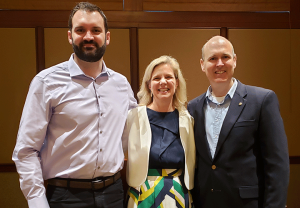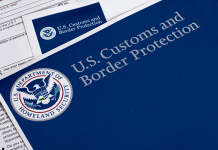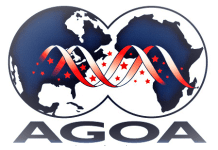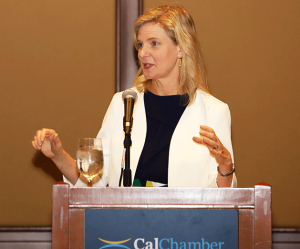
Overlapping interests and shared values make Australia, the United States and California strong partners on economic, security and climate change issues, Australia Consul General Tanya Bennett told a California Chamber of Commerce breakfast audience last week.
Bennett was the featured speaker at the September 13 breakfast hosted by the CalChamber Council for International Trade. Her talk and lively exchanges with the audience underscored the many existing connections between Australia and the United States.
The Consul General identified the three pillars of the relationship between Australia, the United States and California as their longstanding economic partnership; the strategic alliance for security and defense in the region; and work on climate and clean energy policies.
Longtime Partners
Recapping the economic partnership, Bennett noted that two-way trade between Australia and California was $6.7 billion in 2023, and California is one of Australia’s largest state trading partners. Top California exports to Australia include aerospace, medical and communications equipment.
More than 400 Australian companies are located across California, generating 12,000 jobs, and each week there is notice of a new Aussie company that has located in the state.
Moving on to the U.S.-Australia defense alliance, Bennett pointed to recent meetings of U.S. and Australia counterparts in the government agencies responsible for defense. A significant development in the defense relationship, she said, is progress being made on aligning export controls to strengthen defense capabilities.
She noted that Australia, the United Kingdom and the United States have created mechanisms that will facilitate billions of dollars in secure defense trade without the need for further authorizations. That work has created an “enabling environment” for much more commercial activity, she said.
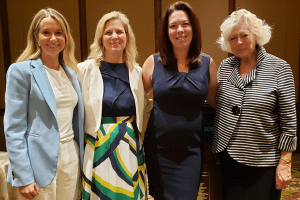
Climate/Clean Energy
Consul General Bennett devoted much of her remarks to the opportunities for collaborations in climate and clean energy policy.
Australia and California have similar experiences related to wildfire, droughts and flood risks, she observed. For example, the two have exchanged firefighting personnel and equipment for many years. The memorandum of understanding (MOU) with California, signed last year, is the only climate MOU Australia has signed, an indication of the impact and importance Australia places on this area, she emphasized.
The signing of the MOU takes place against the backdrop of changing worldwide security and economic dynamics. Bennett commented that there is a commonality in how nations are structuring their economies and moving to protect their interests, including through policies to secure their energy needs, drawing an explicit link between economic security and national security.
The “Future Made in Australia” agenda, a part of the Australian budget, aims to put in place incentives to increase private sector investments and help build a stronger, more diverse and resilient economy, maximizing the economic and industrial benefits of the move to net-zero emissions.
For U.S. businesses, Bennett said, the Australian agenda will provide a new front door to international projects to make it simpler to invest in Australia. Worth noting, she said is that Australia is a leading clean and ethical producer of critical minerals — lithium, cobalt and rare earths.
Another recent development she highlighted is that to support bilateral trade in critical minerals, there is a single point of entry for companies to approach two entities providing finance help — the Export-Import Bank of the United States and Export Finance Australia.

Australia-California
Because Australia and California share a commitment to climate change and the transition to using cleaner fuels, the MOU is an “active concrete work program” that brings together researchers, industry and community representatives, Bennett said. Among the 10 projects already begun are efforts focusing on electric vehicles, low-carbon fuels, hydrogen, offshore wind, energy efficiencies, research on minerals and artificial intelligence (AI), and sustainable cities.
She said Australia is learning from California’s experience on zero-emission vehicles, including developing standards and public infrastructure requirements, which are helping Australian policy and industry; and the state’s low carbon fuel standard is helping as Australia works on sustainable aviation fuel.
Similarly, Australian energy efficiency standards are helping California work on upfront carbon emissions and reduction methods.
A new, practical partnership between Australia and California brings together national science agencies for a water monitoring system for the Sacramento Delta. Using data from water sensors, the project will enable watchers to forecast the health of waterways.
An area for further collaboration, she reported, is developing hydrogen policy, including certification and verification of low-carbon products. Australia has a leading hydrogen certification scheme, known as the “guarantee of origin,” she said. The scheme is expandable and scalable and provides a way to measure and verify the intensity of hydrogen production in low-carbon products, providing transparency for buyers and sellers.
Staff Contact: Susanne T. Stirling
